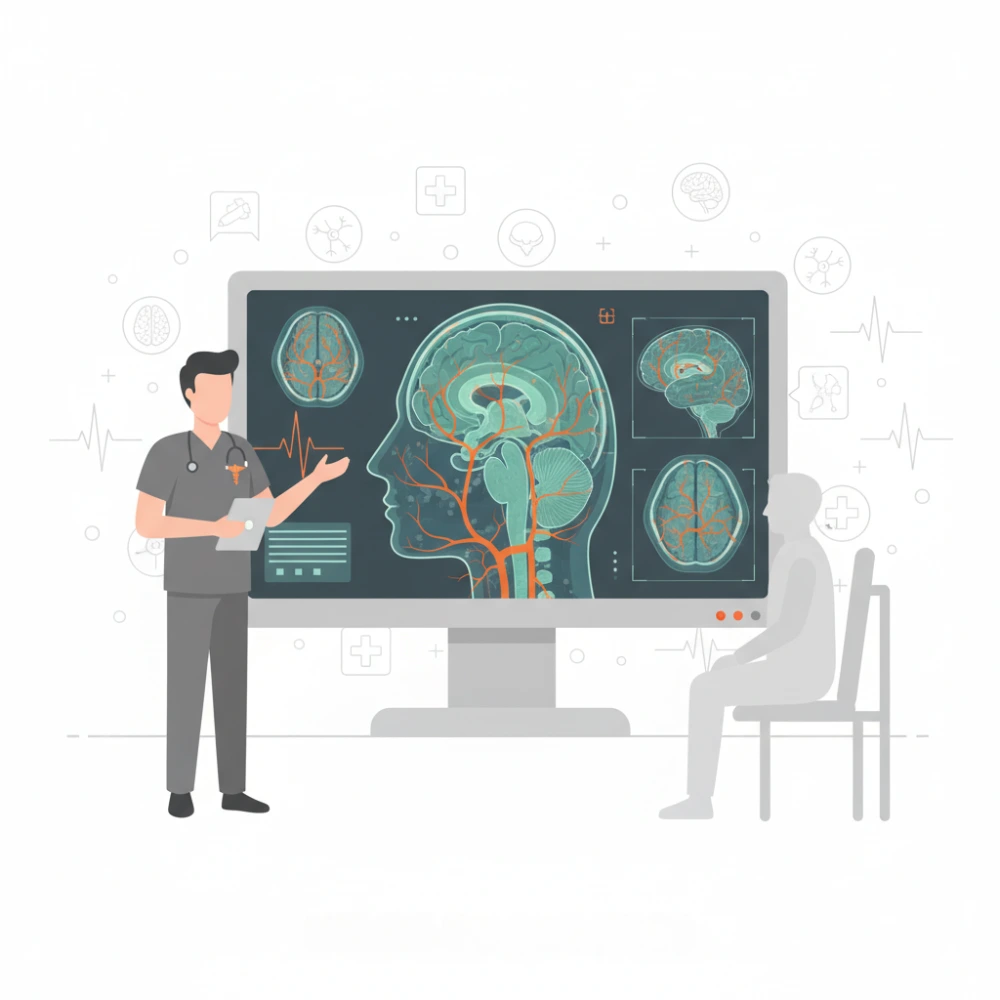
Brain CT Scan – Advanced, Accurate & Detailed Brain Imaging
At Akshar Imaging Centre, we provide advanced Brain CT Scan services using the latest multidetector computed tomography (MDCT) technology. Our scans produce high-resolution, cross-sectional 3D images of the brain and skull, allowing neurologists, neurosurgeons, and physicians to accurately diagnose stroke, head injury, brain tumors, hemorrhage, infections, and other neurological conditions.
A Brain CT Scan is a safe, non-invasive, and painless diagnostic imaging test. Compared to standard X-rays, it provides far more detailed information, making it the preferred choice for evaluating brain structure, bleeding, trauma, or stroke symptoms.
What Is a Brain CT Scan?
A Brain CT Scan uses advanced computed tomography to capture thin-slice, high-resolution images of the brain, skull, sinuses, and surrounding tissues. It helps doctors detect intracranial bleeding, fractures, tumors, swelling, fluid accumulation, infections, and structural abnormalities. This scan is crucial for rapid diagnosis and treatment in emergency cases such as head injuries or strokes.
Why It’s Performed / Common Indications
- Sudden headache, dizziness, or loss of consciousness
- Stroke symptoms such as weakness, confusion, or speech difficulty
- Head injury or trauma evaluation
- Detection of brain tumors, cysts, or abscesses
- Assessment of intracranial bleeding, swelling, or hydrocephalus
- Investigation of seizures or unexplained neurological symptoms
- Evaluation of sinus or skull fractures
- Preoperative planning or post-surgical brain evaluation
- Detection of brain infections or inflammatory diseases
Preparation
- Usually, no special preparation is required.
- You may be asked to fast for a few hours if contrast dye is needed.
- Remove any metallic objects, hairpins, or jewelry near the head or neck area.
- Wear comfortable clothing or a gown during the scan.
- Inform the technologist if you are pregnant or suspect pregnancy.
- Disclose any allergies, kidney issues, or prior contrast reactions if contrast is planned.
Procedure
- You will lie down on the CT scanner table, with your head positioned carefully.
- The scanner rotates around your head to capture thin-slice, high-resolution images.
- You may be asked to remain still to avoid motion blur.
- If contrast dye is required, it will be administered via an IV line.
- The scan itself takes only a few minutes; the entire process usually lasts 10–15 minutes.
- The procedure is painless, safe, and non-invasive.
What Happens Next (Interpretation)
A radiologist carefully reviews the Brain CT images to evaluate:
- Evidence of bleeding, clots, or stroke
- Brain tumors, cysts, or abscesses
- Fractures or trauma-related injuries to the skull
- Signs of infection, swelling, or fluid accumulation
- Hydrocephalus (fluid buildup) or pressure abnormalities
- Structural defects or congenital brain issues
Reports are generated promptly and shared with your doctor for accurate diagnosis, treatment planning, and emergency care.
Benefits vs. Risks
Benefits:
- Provides detailed 3D visualization of the brain and skull
- Essential for emergency evaluation of head injury or stroke
- Detects brain abnormalities often missed on X-rays
- Quick, accurate, and non-invasive diagnostic tool
Risks:
- Involves a small dose of radiation (minimized with modern CT scanners)
- Rare risk of allergic reaction if contrast dye is used
- Not recommended during pregnancy unless medically necessary
Why Choose Akshar Imaging Centre
- Advanced multidetector CT scanner for high-resolution brain imaging
- Experienced radiologists specialized in neuroimaging and stroke diagnosis
- Comfortable, patient-friendly environment with minimal wait times
- Fast report delivery for emergency and routine cases
- Convenient location in Ahmedabad with easy appointment scheduling
Frequently Asked Questions (FAQs)
1. Is a Brain CT Scan safe?
Yes. It involves minimal radiation exposure and is very safe. Special care is taken for children and pregnant women.
2. How long does the scan take?
The scan itself takes just a few minutes; the full appointment usually lasts 10–15 minutes.
3. Why has my doctor advised this test?
It may be to detect stroke, bleeding, injury, tumors, or neurological disorders.
4. Do I need contrast dye for this scan?
Contrast is used only if your doctor requires enhanced imaging of brain vessels or certain structures.
